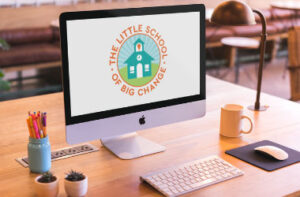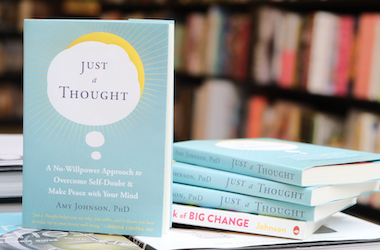It’s common for us to play small in our lives when the fear of failing is too much to bear.
In order to acquire skills, or have a sliver of a chance at getting “good” at something, we need to be allowed to mess up and make those dreaded, so-called “mistakes.” But when we have a fear of failure, mistakes are terrifying. Sometimes, the fear is so intense that it’s labeled as “atychiphobia.”
Our mind tells us what mistakes are, and then comes up with methods for avoiding them. Minds tell us to set smaller, more “achievable” goals, because otherwise we won’t be able to handle the soul-crushing ego hit that washes in when we come up short. Sometimes, they tell us we’re better off not trying at all. As a result, living with an intense fear of failure keeps us feeling limited and stuck.
Ironically, fear of failure is what makes us most likely to “fail,” i.e. not achieve a goal, because continued attempts at success appear threatening, and we’d rather avoid the threat and numb.
Fear of Failure is Fear of Disappointment
The fear of failure is really just the fear of disappointment. We’re afraid of having to live with ourselves knowing we’ve failed. But, disappointment is a feeling, and feelings, in and of themselves, are harmless.
We’ve all felt that disappointed feeling; we can recall a time when we’ve gotten our hopes up about something only to watch it not pan out. We thought that we would get the job, but instead we got a cookie-cutter, impersonal rejection email from HR. We thought that other person liked us back, but it turns out they didn’t return our affections.
Things get easier when we realize that that disappointment is just a feeling like any other, and a feeling is nothing but a label that our mind puts on a sensation that moves through our bodies. What if disappointment itself doesn’t exist? What if it’s just a word we attach to a flavor of energy that runs through us?
What is that feeling of disappointment, really? It’s only a moving, shifting, bodily sensation. Just as excitement, giddiness, and grief move through us, so does disappointment and the fear of failure. Feelings actually move through us quite quickly; it is the mind that makes things appear “sticky.” Anything beyond that quick-moving feeling is a repetitive story that we latch onto because we’re afraid of not properly learning from mistakes. That story is a projection of the past and prediction of the future that only exists in our minds, not in reality itself.
The truth is, feelings are quite fluid when we don’t attach ourselves to the mind’s repetitive stories about them. A feeling can’t tarnish your innate well-being; it’s weather on top of a blue sky. You are the blue sky, and the fear of failure, or any disappointment you might feel, is a temporary, passing sensation. We can feel the fear of failure, or feel disappointment, and gently observe as the feelings pass through our bodies.
It’s not true that avoiding failure is the way to avoid feeling disappointed. The mind may tell us that, but it’s wrong. Disappointment, along with plenty of other unpleasant feelings, will come along at some point anyway. It might even come because we are disappointed in ourselves for having let the fear of failure keep us from chasing our dreams. Feelings can’t actually be avoided by attempting to control life.
When we live in fear of a feeling, we don’t get the opportunity to realize that the feeling is completely survivable. The fear of feeling things- disappointment included- is worse than the feeling itself. Fear of failure is fear of something that you are infinitely capable of handling.
Failure is a Made-up Concept

The mind comes up with the criteria of what failure is, and then comes up with some scary stories of what will happen if we fail.
The mind makes it personal when we don’t tick the boxes it wants us to tick, and comes up with all kinds of stories of what that will mean for our future.
“I’m just the type of person who doesn’t achieve his goals.”
“I don’t work hard enough.”
“I turned left when I should have turned right.”
“Other people can tell I’m a failure.”
Does the mind know any of these things for sure? Of course not. They’re just chatter and made-up speculation. But the mind searches for patterns because that is its job: to understand a situation in order to know whether danger exists in it. It loves black-or-white, all-or-nothing thinking, because it likes to save energy by oversimplifying. It loves to find evidence to support its beliefs, regardless of whether the belief is “the truth.” The mind simply isn’t as wise as it claims to be.
What if the mind’s plan isn’t actually best for you in the long run? We can live in fear of failure, but what if failure is the best possible overall outcome of the endeavor in question?
As we live more of life, we accumulate examples of how wrong the mind can be, and how it contradicts itself from one moment to the next. The mind may have us convinced things will go one way, or that things should go one way, but it’s often completely wrong. In any given moment, we don’t see the bigger picture or the true possibilities at hand.
The mind takes a complex, nuanced life experience and tries to slam it into one of two categories: pass or fail. This is overly simplistic and glosses over the vast possibilities that exist in any circumstance. The mind doesn’t always understand the roundabout ways we can get to the places we want to go, so when it meets an unexpected but necessary detour, it chalks it up as a failure.
Failure as a concept is made-up; therefore, the fear of failure is fear of a made-up thought.
The most important thing to see about thought (which is all the concept of failure, or the fear of failure, is), is that it changes moment-to-moment, regardless of our circumstances, in its own way. When our thinking is heavy, so is the perception of our “failure.” When our thinking is lighter, our “failures” don’t look so defining. In fact, they may not look like failures at all!
Failure Only Happens when You Give Up
The truth is that nothing is as as black-and-white as the mind makes it seem. A mind may tell us that our future happiness rests on one single event or opportunity, but this simply cannot be the case. Happiness doesn’t come from circumstance (because any circumstance can be felt in infinitely many ways), but also, life has infinitely many chances for re-tries. If you didn’t climb the mountain in the time you hoped for, you can try again next week. If you don’t get this job, you’ll get another one.
The only time we can say we haven’t achieved the thing we’ve set out for is when we die. And at that point, we won’t mind, because our mind will be dead, and whatever else lingers will linger on in another form, likely not caring one bit whether we hit that goal we set out for. Failure to achieve a dream can only really happen when we’ve given up on it. You never know if the next day is the day that your call will come in.
Mistakes and shortcomings may look dangerous to a mind, but in reality, they’re just guideposts. They are not the disappointing and scary events painted by the mind. They nudge us gently along whatever path we’re meant to walk. They are neutral.
In Defense of “Failing”…
Just because the only logical definition of “failure” is not giving up, that doesn’t mean giving up is a bad thing. The term “giving up” feels loaded with personal, negative associations, but sometimes, it’s the best thing for us. Fear of failing and fear of giving up are actually fears of neutral, harmless life experiences.
When a mind hears that the only true failure is giving up, it will latch onto the idea that “not giving up” is the answer. Then, it will tell you all kinds of things about what it means when you finally decide to change paths and abandon a goal. But the antidote to the fear of failure is not to replace it with the fear of giving up, because sometimes, giving up is the best thing for us.
The mind is what makes goals and holds onto them, but sometimes, life has other plans. How do we really know what is meant for us, or what is best for us? We don’t. We only know what feels right in the present moment. The mind tries to put things in categories, label things good and bad or better and worse, but it has no idea what it’s talking about.
True freedom comes from entertaining the possibility that there might be something bigger at play.
What if you “failed” at the thing you wanted because there was something “better” in store for you?
Sometimes, we’re led through life chasing the shiny thing, but we’re not actually meant to get the shiny thing, because there’s something better in store. If you don’t get the job your ego wanted, how do you know there isn’t a better one waiting down the line? The mind thinks it knows what you want, but the truth is, it doesn’t even know what it wants! It’s adorably, innocently clueless. It’s a little chatterbox labeling your experience one way or another, without any real control or wisdom.
There’s Nothing to Fear
When we see that fear is just a feeling, and the thing we’re fearing – disappointment – is just a feeling, and that the experiences we go through are neutral when we look beyond the mind, we realize, there’s nothing to fear at all. We’re no longer gripped by the fear of failure – we can try things, experiment, grow, learn, and enjoy.
Freedom from Fear of Failure with Dr. Amy Johnson
Amy Johnson is a psychologist and Change Coach who helps people find freedom from anxiety, habits, insecurity and low self-esteem. She has written several books and leads live courses and group coaching.
Amy Johnson helps find freedom from anxiety and worry through insight and wisdom, not willpower.
One of Amy Johnson’s most popular books is The Little Book of Big Change, about the principles behind the human experience. The Little Book of Big Change shares a unique approach to healing anxiety, worry and insecurity. The Little Book of Big Change will help you understand what is at the root of your anxiety, low self-esteem, and self-destructive habits.
About the Author

Becky Gagnon is a certified Change Coach.
You can see more about Becky and her coaching services here.






